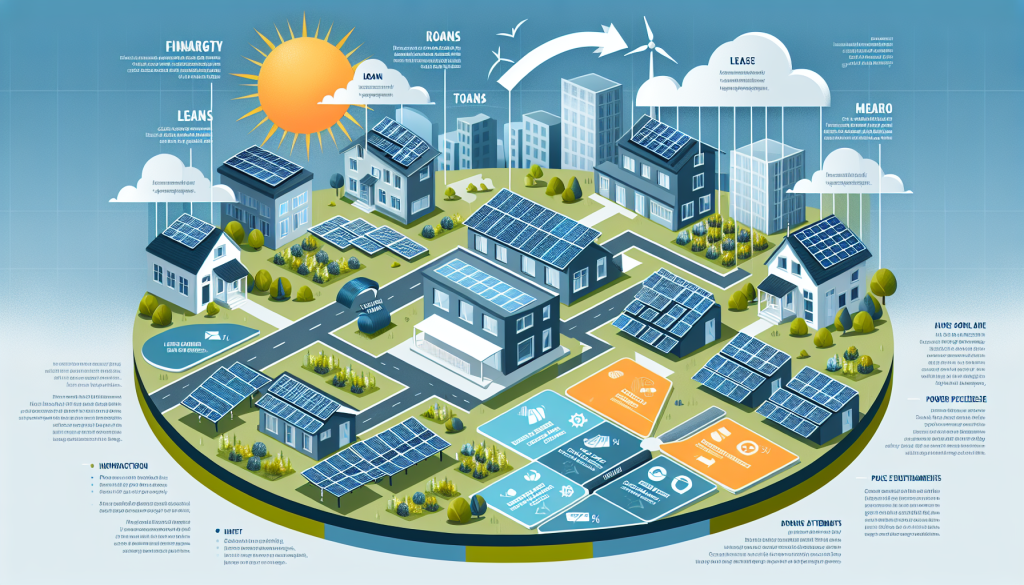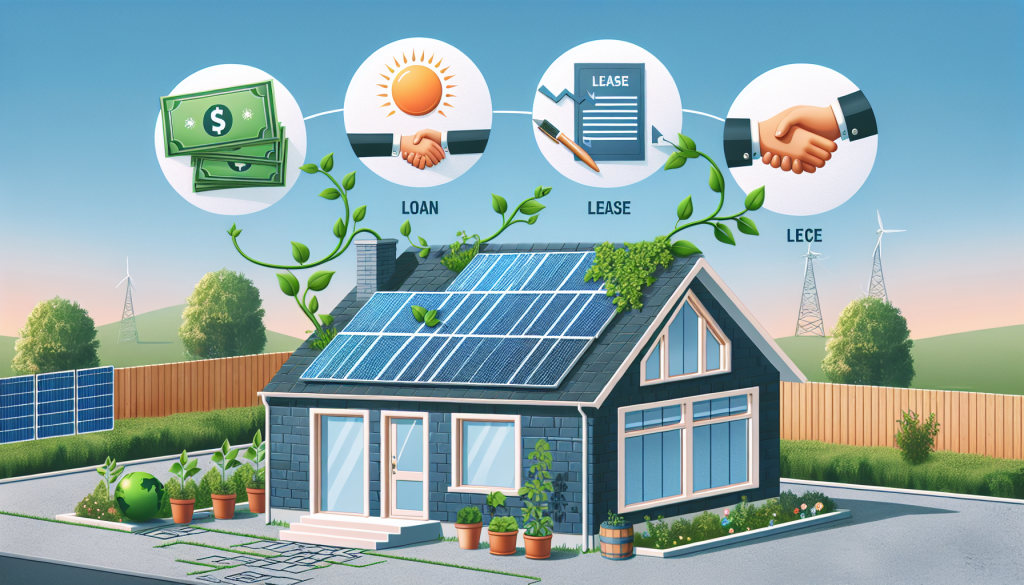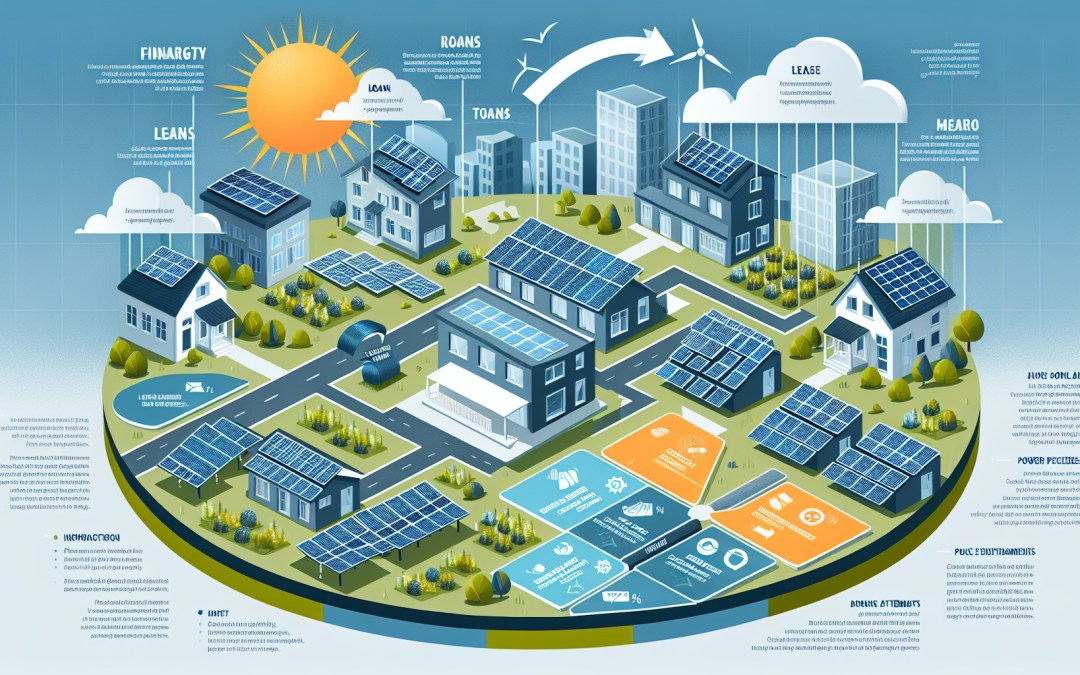Are you considering switching to solar energy but not sure how to finance the installation of solar panels? Look no further, because Wild Sun Solar has got you covered! When it comes to solar panel financing solutions, Wild Sun Solar understands your needs and treats you like family. With their expertise and personalized approach, they can guide you through the process and help you find the best financing options available. Call Wild Sun Solar today and take the first step towards harnessing the power of the sun while saving money on your energy bills.

Understanding Solar Panel Financing
Introduction to Solar Panel Financing
If you’ve been considering installing solar panels for your home or business, but are worried about the upfront costs, solar panel financing can be a great solution for you. Solar panel financing allows you to spread out the cost of your solar installation over time, making it more affordable and accessible. In this article, we will explore the different options available for solar panel financing and provide you with tips on how to choose the right financing option for your needs.
Benefits of Solar Panel Financing
Solar panel financing offers several benefits that make it an attractive option for homeowners and business owners alike. Firstly, solar panel financing allows you to start enjoying the benefits of renewable energy without a large upfront investment. By spreading the cost of your solar installation over time, you can immediately start saving on your electricity bills and reduce your carbon footprint.
Additionally, solar panel financing can also increase the value of your property. Studies have shown that homes and businesses with solar installations sell at a higher price and are more attractive to potential buyers. This not only allows you to enjoy the benefits of solar energy while you own the property but also provides a significant return on investment if you decide to sell in the future.
Different Types of Solar Panel Financing Options
When it comes to solar panel financing, there are various options available to suit different needs and financial situations. Let’s explore some of the most common types of solar panel financing options.
Traditional Financing Options
Home Equity Loans and Lines of Credit
One of the most common ways to finance your solar installation is through a home equity loan or line of credit. If you have equity in your home, you can borrow against it to finance your solar project. Home equity loans typically offer lower interest rates and longer repayment terms, making them a popular choice for solar financing.
Personal Loans
Another option is to take out a personal loan to finance your solar installation. Personal loans can be obtained from banks, credit unions, or online lenders. These loans can be either secured or unsecured, depending on the lender’s requirements. Personal loans are a flexible financing option that allows you to choose your loan amount and repayment term based on your financial situation.
Credit Cards
While not the most common option, some people choose to finance their solar panels through credit cards. It’s worth noting that credit cards often have higher interest rates compared to other financing options, so it’s essential to carefully consider this option and ensure that you can pay off the balance quickly to avoid accruing high interest charges.
Government-Sponsored Loans and Programs
Certain government-sponsored loans and programs are specifically designed to promote the adoption of solar energy. These loans and programs often offer favorable terms and conditions, such as low-interest rates and longer repayment periods. Researching and exploring these options can help you find financing solutions tailored to your needs.
Specialized Solar Financing
Solar Leases
Solar leases allow you to “rent” your solar panels instead of purchasing them outright. With a solar lease, the leasing company owns and maintains the solar panels, and you pay a monthly lease fee to use the energy generated by the panels. While you may not receive the full financial benefits of solar ownership, solar leases can be an attractive option for those who want to go solar without the upfront costs or maintenance responsibilities.
Power Purchase Agreements (PPAs)
Similar to solar leases, power purchase agreements (PPAs) allow you to “purchase” the electricity generated by the solar panels without owning the equipment. With a PPA, a third-party owns, operates, and maintains the solar panels, and you purchase the energy at a predetermined rate. PPAs often have long-term contracts, providing stability in energy costs and locking in lower electricity prices.
Property Assessed Clean Energy (PACE) Financing
Property Assessed Clean Energy (PACE) financing allows you to finance your solar installation through a property tax assessment. PACE financing is repaid as part of your property tax bill over an extended period, typically up to 20 years. PACE financing is only available in certain jurisdictions, so it’s essential to check if your area offers this option.
Financing through Solar Installers
Installment Payment Plans
Many solar installation companies offer their own financing options, such as installment payment plans. These plans allow you to make fixed monthly payments over a set period, usually with low or no interest. Installment payment plans provided by solar installers are often tailored to the specific solar system being installed, making them a convenient and straightforward option.
Solar Loans Offered by Installers
Some solar installers offer their own solar loans to help homeowners and business owners finance their solar projects. These loans are designed specifically for the purchase and installation of solar panels. Solar loans offered by installers often have competitive interest rates and may be easier to qualify for compared to traditional loans.
Third-Party Financing and Vendor Programs
In addition to their own financing options, solar installers may also work directly with third-party financing companies or participate in vendor programs. These partnerships allow homeowners and business owners to access a wider range of financing solutions and choose the option that best suits their needs. Working with a solar installer who has established relationships with financing providers can simplify the financing process and streamline approvals.

The Evaluation Process
Determining Your Solar Panel Financing Needs
Before you apply for solar panel financing, it’s crucial to evaluate your needs and determine how much financing you require. By assessing the cost of your solar installation, factoring in any potential incentives or rebates, and considering your budget, you can determine the amount of financing you need. This information will be useful when comparing financing options and submitting loan applications.
Evaluating Qualification Criteria
Different financing options have different qualification criteria, such as credit score requirements and income verification. It’s essential to understand the qualification criteria for each financing option and assess your eligibility. If you have a low credit score or limited income, you may need to explore options specifically designed for individuals with less-than-perfect credit or lower income levels.
Reviewing Terms and Conditions
Before committing to any solar panel financing option, carefully review the terms and conditions of the loan or lease agreement. Pay attention to key information such as interest rates, repayment terms, fees, and any potential penalties or restrictions. Understanding the terms and conditions will help you make an informed decision and avoid any surprises down the line.
Comparing Interest Rates and Fees
When comparing different financing options, it’s essential to consider the interest rates and fees associated with each. Lower interest rates can save you money over the life of your financing, while higher fees can increase your overall cost. Take the time to compare interest rates and fees across different options to ensure you’re getting the best deal.
Choosing the Right Solar Panel Financing Option
Considering Your Financial Situation
When choosing a solar panel financing option, it’s crucial to consider your current financial situation. Evaluate your income, expenses, and existing debt to determine how much you can afford to dedicate to solar panel financing each month. Understanding your financial capacity will help you choose an option with manageable monthly payments and avoid any financial strain.
Assessing Your Long-Term Goals
Solar panel financing is a long-term commitment, so it’s essential to align your financing choice with your long-term goals. Consider factors such as the length of the financing term, potential future expansions or upgrades, and your overall sustainability objectives. By choosing a financing option that aligns with your goals, you can make the most of your solar investment.
Calculating Return on Investment
One of the primary benefits of going solar is the potential for long-term cost savings. When evaluating financing options, calculate your anticipated return on investment (ROI). Consider factors such as energy bill savings, tax incentives, and other financial benefits. By comparing the ROI of different financing options, you can choose the option that offers the most favorable financial outcome.
Accounting for Maintenance and Repairs
Solar panels typically require minimal maintenance, but it’s essential to consider any potential costs for maintenance and repairs when choosing a financing option. Some financing options may include maintenance and repair services, while others may require you to cover these costs separately. Understanding the potential for maintenance and repair expenses will help you budget accordingly.
Applying for Solar Panel Financing
Gathering Necessary Documentation
When applying for solar panel financing, you will need to gather certain documents to support your loan application. Typical documentation includes proof of income, tax returns, identification, and sometimes bank statements or utility bills. Contact your chosen financing provider to determine the specific documentation requirements and ensure you have everything in order before applying.
Submitting Loan Applications
Once you have gathered all the necessary documentation, it’s time to submit your loan applications. Different financing options may require applications to be submitted through different channels, such as online applications or in-person appointments. Be prepared to provide accurate and complete information to facilitate a smooth application process.
Negotiating Loan Terms
In some cases, you may have the opportunity to negotiate loan terms with your financing provider. If you have a strong credit history or can demonstrate your ability to repay the loan, you may be able to negotiate for better interest rates or more favorable repayment terms. While not guaranteed, it’s always worth exploring the possibility of negotiating loan terms to maximize your financial benefits.
Closing the Loan Agreement
Once your loan application is approved, you will need to review and sign the loan agreement. Take the time to read the agreement carefully and ensure that all terms and conditions discussed during the application process are accurately reflected. Seek clarification if there is anything you don’t understand. Once you are comfortable with the agreement, sign it and complete any other necessary paperwork to finalize the loan.
Common Challenges in Solar Panel Financing
Credit Score and Creditworthiness
One of the most significant challenges in solar panel financing is creditworthiness. Many financing options require a good credit score to qualify for favorable terms. If you have a low credit score, you may face higher interest rates or be ineligible for certain financing options. Working on improving your credit score or exploring financing options specifically designed for individuals with lower credit scores can help overcome this challenge.
Unpredictable Solar Incentive Programs
Solar incentive programs, such as tax credits or rebates, can significantly reduce the cost of solar installations. However, the availability and value of these programs can vary over time and between jurisdictions. Keeping track of solar incentive programs and understanding their impact on your financing options can be challenging. Researching available incentives and consulting with solar experts can help you navigate this challenge.
Fluctuating Interest Rates
Interest rates can play a significant role in the overall cost of solar panel financing. However, interest rates are subject to fluctuations in the broader financial market. While fixed interest rates provide stability, adjustable rates can vary over time. It’s essential to monitor interest rate trends and understand the potential impact on your financing costs.
Confusing Financing Terminology
The world of solar panel financing comes with its own set of terminology, which can be confusing for those not familiar with the industry. Terms such as net metering, power purchase agreements, or feed-in tariffs may be unfamiliar to many. Taking the time to research and understand these terms or seeking expert advice can help demystify the financing process and ensure you make informed decisions.
Tips for Successful Solar Panel Financing
Improving Your Credit Score
If your credit score is preventing you from accessing favorable financing options, there are steps you can take to improve it. Paying bills on time, reducing your debt-to-income ratio, and disputing any errors on your credit report are some strategies that can help improve your credit score over time.
Researching Available Incentives
Solar incentives can significantly reduce the cost of your solar installation. Take the time to research and understand the available incentives in your area. Programs such as the federal Investment Tax Credit (ITC) or state-level rebates can provide significant savings. Consult with solar experts or reach out to local government authorities to ensure you are aware of all applicable incentives.
Getting Multiple Quotes and Comparing Offers
When it comes to solar panel financing, it’s always a good idea to shop around and get multiple quotes from different lenders or solar installers. By comparing offers, you can identify the most competitive rates and terms. Additionally, getting multiple quotes can provide you with negotiating leverage when discussing loan terms with potential financing providers.
Seeking Expert Advice
Solar panel financing can be complex, and the decision-making process can be overwhelming. Consider seeking expert advice from professionals in the solar industry. Solar installers, financial advisors, or renewable energy consultants can provide valuable insights and help you navigate the financing options available to you.
Conclusion
By understanding the various solar panel financing options, evaluating your needs and goals, and conducting thorough research, you can make an informed decision that suits your financial situation and long-term objectives. Solar panel financing allows you to embrace the benefits of renewable energy without the burden of upfront costs, making it a viable option for homeowners and business owners alike. Start exploring your financing options today and enjoy the many benefits that solar panel financing can bring.




